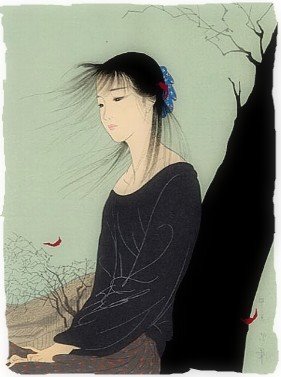
Kawabata Yasunari: se penso che quello che emerge dalla penna di uno scrittore o di un poeta è solo la punta dell'iceberg di ciò che egli ha "sentito", intuisco il perchè del suicidio del vecchio Kawabata.
La sua vista sul mondo è così analitica e simile ad un bisturi affilato dalla consapevolezza delle cose, da parere a tratti una benedizione poetica e una maledizione della vita.
La sua attenzione per le donne pare a tratti quasi una necessità dell'anima di trovare il placido conforto della carne transustanziata in bellezza, nella grazia, nell'armonia (fatta anche di difetti e di vitalità).
Volevo fare delle citazioni a sostegno di questi paragrafi, ma lo ritengo inopportuno: sarebbero frammenti di ala di farfalla...ritengo sia da parte mia cosa migliore suggeerire almeno trelibri:
- LA CASA DELLE BELLE ADDORMENTATE
- IL PAESE DELLE NEVI
- PRIMA NEVE SUL FUJI (raccolta)
-------------------------------------------------------------
Biografia da: nobelprize.org
Yasunari Kawabata, son of a highly-cultivated physician, was born in 1899 in Osaka. After the early death of his parents he was raised in the country by his maternal grandfather and attended the Japanese public school. From 1920 to 1924, Kawabata studied at the Tokyo Imperial University, where he received his degree. He was one of the founders of the publication Bungei Jidai, the medium of a new movement in modern Japanese literature. Kawabata made his debut as a writer with the short story, Izu dancer, published in 1927. After several distinguished works, the novel Snow Country in 1937 secured Kawabata's position as one of the leading authors in Japan. In 1949, the publication of the serials Thousand Cranes and The Sound of the Mountain was commenced. He became a member of the Art Academy of Japan in 1953 and four years later he was appointed chairman of the P.E.N. Club of Japan. At several international congresses Kawabata was the Japanese delegate for this club. The Lake (1955), The Sleeping Beauty (1960) and The Old Capital (1962) belong to his later works, and of these novels, The Old Capital is the one that made the deepest impression in the author's native country and abroad. In 1959, Kawabata received the Goethe-medal in Frankfurt.
Yasunari Kawabata died in 1972 (suicide).
Yasunari Kawabata died in 1972 (suicide).









